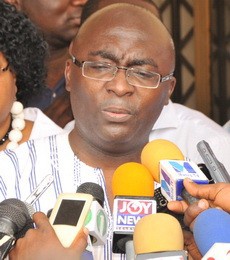
Dr. Mahamudu Bawumia, Vice – Presidential candidate of the New Patriotic Party for the 2008 and 2012 Presidential elections, has questioned the credentials of the ruling NDC as a social democratic party and stated that with the inherent corruption in government, Ghana would not be able to make any significant strides at development.
Dr. Bawumia made these comments while delivering the 1st Alhaji Aliu Mahama Memorial lectures under the topic, “DISCIPLINE IN ECONOMIC MANAGEMENT: THE KEY TO SUSTAINABLE GROWTHAND PROSPERITY”
Speaking at the lecture, Dr. Bawumia stated “Mr. Chairman, discipline as the key to economic growth and development also entails a discipline to pursue a clear vision and the discipline needed to manage the already inadequate resources honestly. What is interesting is that all the political parties in Ghana have laid claim to commitments to protecting the poor and vulnerable as part of their ideologies. To what extent have these commitments been honoured? It is instructive to examine the record of some democratically elected governments and their ideologies.”
He noted that Dr. Kwame Nkrumah, Ghana’s first president was, for example, a socialist. This meant a government led development strategy and proceeded to state some of the legacies of the Nkrumah administration including free education, free health care and the establishment of state industries.
“Ideologically Busia was a believer in market capitalism but wanted to build a democratic welfare state where each is his brother’s keeper”, he said and proceeded to list a number of social intervention and enhancement programmes put in place by the Busia administration.
On the Kufuor administration, Dr. Bawumia said “The NPP government just like Busia’s PP government believed that there is the constant need in a nation like ours to cushion segments of the society and ensure that they are carried along in the country’s quest to develop. As a result of the many interventions and programmes, poverty declined from some 40% of the population in 2000 to 28% by 2008 along with significant increases in access to healthcare and education enrollment.
The 2001-2008 period also saw a significant increase in social spending aimed at protecting the poor and vulnerable in society.”
He proceeded to mention various programmes such as the National health Insurance programme, the School Feeding Programme, the Capitation Grant, the National Youth Employment Programme and many other such social intervention programmes established under the Kufuor administration to protect the vulnerable and cushion the deprived in society.
Touching on the NDC however, Dr. Bawumia found it difficult to understand how a party that prided itself as a social democratic party was the same party which in government was supervising the weakening of various social intervention programmes like the NHIS, NYEP and school feeding programme while at the same time, failing to establish social intervention programmes on its own.
“To what extent has the NDC’s covenant with Ghanaians to deliver on its social democratic vision been realized over the last five years? Has the NDC had the discipline to implement its manifesto promises?
The NDC is supposed to be a Social Democratic Party. But what type of socialism is this that imposes such hardships on workers and ordinary Ghanaians. What type of socialism is it that oversees the weakening of social safety nets such as the National Health Insurance Scheme, Free Maternal care, School Feeding and National Youth Employment Programme? At least in Nkrumah’s socialism one saw a vision that he was committed to and attempted to implement with free education, healthcare, industries, workers brigade, state farms etc.
Mr. Chairman, the socialism being practiced by the NDC is more in words than in action. In action, it can best be described as “Akonfem Socialism”. Akonfem socialism” is this new brand of socialism where the government officials engage in “chopping” the meat to the bone. Rather than focusing on serving the people, our Akonfem socialists focus on coming up with schemes to steal money from the people. This is why we have the creation of schemes such as GYEEDA, SADA, SUBAH, WAYOME, WATERVILLE, ISOTOFON, AAL, where the state has been defrauded of billions of Ghana cedis which could otherwise have been used for productive development expenditure. This is only what we know about. This is not what Ghanaians expect from the party of “Probity and Accountability”, he said.
Dr. Bawumia mentioned individuals like Martin Amidu and Manasseh Azure who have taken up the fight against corruption but added “We appear to be losing the battle against very powerful forces. So what should we do?”
Dr. Bawumia suggested that the nation should debate the possibility of having an independent body with parliamentary oversight to be in charge of the award of contracts since an overwhelming majority of governmental corruption occurs in the award of contracts.
“Mr. Chairman, if you look at the canker of corruption, it is clear the over 95% of corruption takes place in the areas of award of contracts and the procurement of goods and services by the public sector. In my humble opinion, the surest way to deal with this problem is to take the responsibility to award contracts and undertake procurement out of the hands of the public sector and politicians and rather give it to an independent body with a value for money secretariat (under parliamentary oversight). The independent body should be made up of reputable professional local and international procurement institutions and experts (and representatives from civil society). This is the model that was used in the execution of projects under the Millennium Challenge Corporation (MCC) such as the N1 Highway. The MDAs or even the Presidency had no role in the award of contracts for MCC projects. Once this type of model is put in place, public officials and politicians will focus on policies and service and not on their ability to make millions of dollars through dubious contracts and procurement. This is an idea that we can discuss on its merits on a multi-partisan basis and come up with a workable solution.”